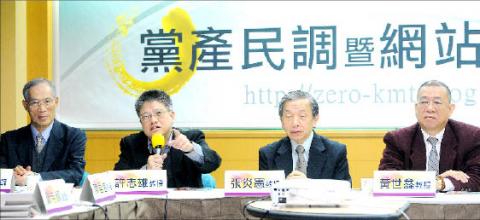|
2012 ELECTIONS: KMT
assets are a problem: survey respondents
NO COMPETITION: Most respondents to a weekend
survey felt that the KMT’s large party assets create an unfair economic
advantage over other political parties
By Tseng Wei-chen / Staff Reporter

Members of the Zero Party Assets
Alliance speak during a press conference yesterday in Taipei.
Photo: Wang Min-wei, Taipei Times
More than 77 percent of respondents in a
survey conducted by a polling company on behalf of the Zero Party Assets
Alliance felt that the Chinese Nationalist Party’s (KMT) huge assets create
unequal competition between political parties, the alliance told a press
conference yesterday.
The poll, conducted on Saturday and Sunday, showed that 58.8 percent of
respondents agreed that the assets of political parties should be brought to
zero, with 14.3 percent disagreeing.
While 56.3 percent of people polled agreed that political parties should only
use political donations and party subsidies to conduct election events, 22.6
percent disagreed.
A little more than 50 percent of respondents said that parties should not hold
any shares or bonds that have value in the markets, while 28.1 percent
disagreed.
In addition, 50.9 percent agreed that parties who have held large party assets
for a long time were detrimental to the development of democracy, while 29.1
percent disagreed.
Almost 60 percent of respondents agreed that the KMT has had an economic
advantage for a long time, with 50.7 percent of respondents saying they knew
that the KMT’s assets came from taking over Japanese colonial-era assets,
subsidization from national coffers and other special business interests.
A little more than 77 percent of people polled said the KMT’s possession of
large party assets was unfair in the competition among political parties, while
8.6 percent said it was fair.
About 55 percent said they were dissatisfied with how President Ma Ying-jeou
(馬英九), the KMT presidential candidate, has handled the KMT’s assets, while 13.5
percent were satisfied.
Ma had claimed he would sell off all party assets when he became KMT chairman in
2009, but the KMT received NT$2.9 billion (US$95,82 million) in share dividends
that year.
Just over 58 percent of respondents said that political parties should not have
party-run businesses or party assets, while 16.9 percent disagreed with that
statement and 54.5 percent of the respondents said that only amendments to the
Political Party Act (政黨法) would resolve the problems involving party assets.
Alliance convener and head of the Taiwan Association of University Professors,
Chang Yen-hsien (張炎憲), said that KMT assets were an old issue, but also one that
has not been resolved.
He added that because the presidential election is just over two weeks away, the
issue would sharpen the focus on the inequality posed by the KMT’s party assets.
National Taipei University department of public finance professor Huang Shih-hsin
(黃世鑫) said that as long as the KMT asset issue existed, normal democratic
development in Taiwan would be impossible. He added that the influence of party
assets was a problem in the present and the future.
Aside from publishing the poll, the alliance also collected data from an
Executive Yuan Web site listing illicit party assets, which was deleted by the
Ma administration, and published it on its own Web site at http://zero-kmt.blogspot.com.
Translated by Jake Chung, Staff Writer
|
![]()
![]()
![]()